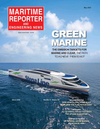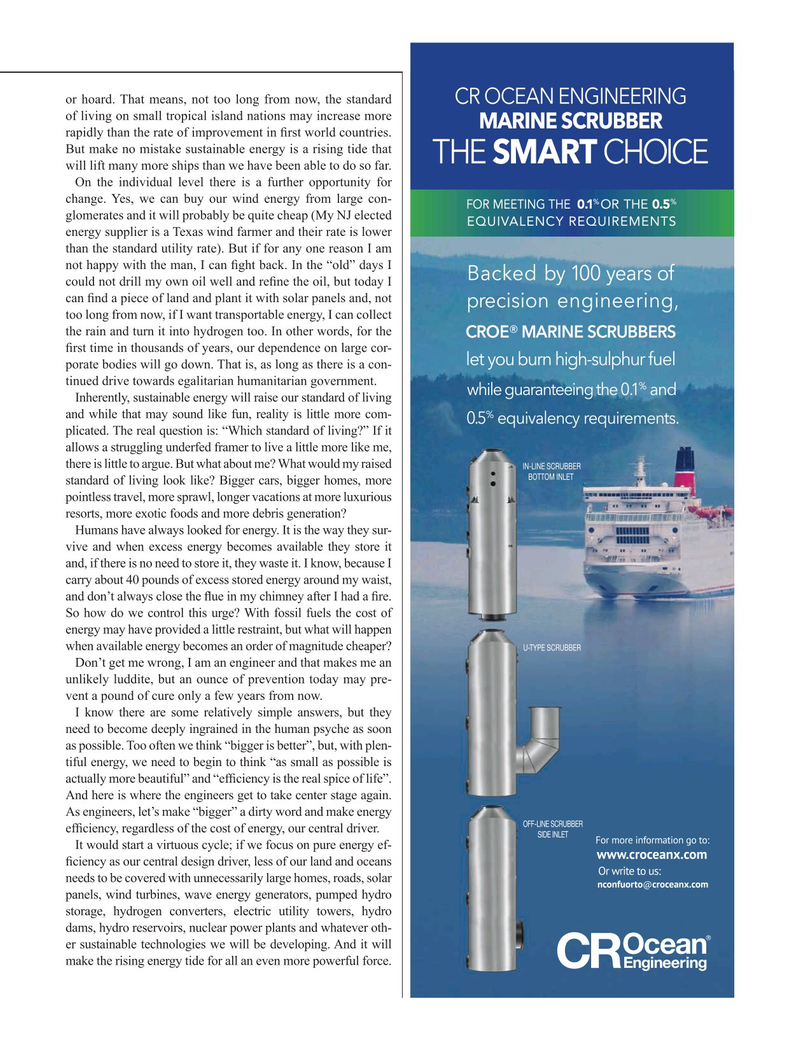
Page 19: of Maritime Reporter Magazine (May 2021)
Green Ship Technologies
Read this page in Pdf, Flash or Html5 edition of May 2021 Maritime Reporter Magazine
or hoard. That means, not too long from now, the standard
CR OCEAN ENGINEERING of living on small tropical island nations may increase more
MARINE SCRUBBER rapidly than the rate of improvement in ? rst world countries.
But make no mistake sustainable energy is a rising tide that
THE SMART CHOICE will lift many more ships than we have been able to do so far.
On the individual level there is a further opportunity for change. Yes, we can buy our wind energy from large con- % %
FOR MEETING THE 0.1OR THE 0.5 glomerates and it will probably be quite cheap (My NJ elected
EQUIVALENCY REQUIREMENTS energy supplier is a Texas wind farmer and their rate is lower than the standard utility rate). But if for any one reason I am not happy with the man, I can ? ght back. In the “old” days I
Backed by 100 years of could not drill my own oil well and re? ne the oil, but today I can ? nd a piece of land and plant it with solar panels and, not precision engineering, too long from now, if I want transportable energy, I can collect the rain and turn it into hydrogen too. In other words, for the
CROE® MARINE SCRUBBERS ? rst time in thousands of years, our dependence on large cor- let you burn high-sulphur fuel porate bodies will go down. That is, as long as there is a con- tinued drive towards egalitarian humanitarian government. % while guaranteeing the 0.1 and
Inherently, sustainable energy will raise our standard of living % and while that may sound like fun, reality is little more com- 0.5 equivalency requirements. plicated. The real question is: “Which standard of living?” If it allows a struggling underfed framer to live a little more like me, there is little to argue. But what about me? What would my raised standard of living look like? Bigger cars, bigger homes, more pointless travel, more sprawl, longer vacations at more luxurious resorts, more exotic foods and more debris generation?
Humans have always looked for energy. It is the way they sur- vive and when excess energy becomes available they store it and, if there is no need to store it, they waste it. I know, because I carry about 40 pounds of excess stored energy around my waist, and don’t always close the ? ue in my chimney after I had a ? re.
So how do we control this urge? With fossil fuels the cost of energy may have provided a little restraint, but what will happen when available energy becomes an order of magnitude cheaper?
Don’t get me wrong, I am an engineer and that makes me an unlikely luddite, but an ounce of prevention today may pre- vent a pound of cure only a few years from now.
I know there are some relatively simple answers, but they need to become deeply ingrained in the human psyche as soon as possible. Too often we think “bigger is better”, but, with plen- tiful energy, we need to begin to think “as small as possible is actually more beautiful” and “ef? ciency is the real spice of life”.
And here is where the engineers get to take center stage again.
As engineers, let’s make “bigger” a dirty word and make energy ef? ciency, regardless of the cost of energy, our central driver.
It would start a virtuous cycle; if we focus on pure energy ef- ? ciency as our central design driver, less of our land and oceans needs to be covered with unnecessarily large homes, roads, solar panels, wind turbines, wave energy generators, pumped hydro storage, hydrogen converters, electric utility towers, hydro dams, hydro reservoirs, nuclear power plants and whatever oth- er sustainable technologies we will be developing. And it will make the rising energy tide for all an even more powerful force.
MR #5 (18-33).indd 19 5/7/2021 12:43:39 PM

 18
18

 20
20
